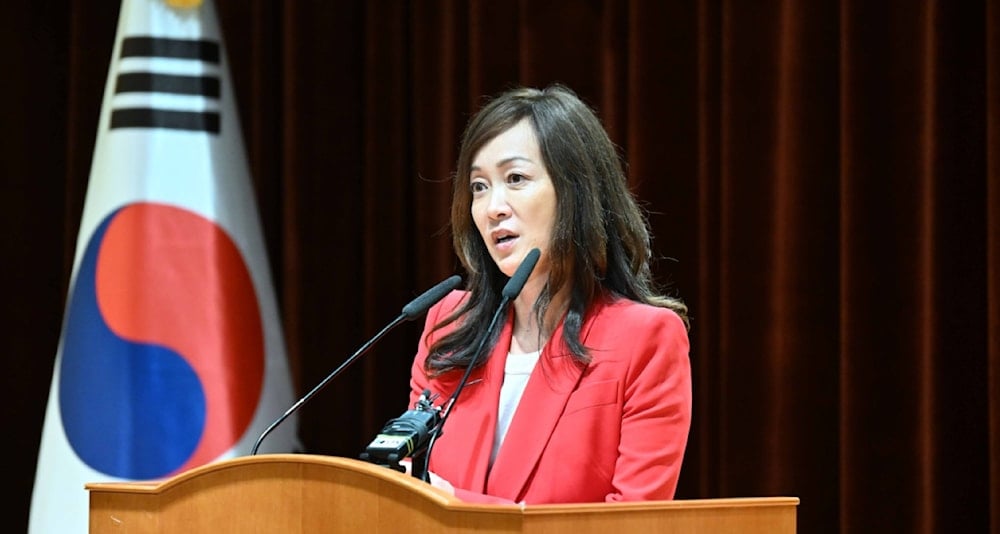Ex-WH, CIA official accused of working for S. Korea for luxury goods
The ex-White House official was indicted for promoting South Korean policy positions, disclosing confidential US government information, and facilitating connections between South Korean government officials and their US counterparts.
-

Sue Mi Terry at a screening of the documentary 'Beyond Utopia,' which she worked on as a producer, November, 2023. (ROK Ministry of Foreign Affairs)
A US foreign policy specialist and former CIA and White House National Security Council (NSC) employee has been indicted on charges of allegedly working as a South Korean government agent in exchange for luxury goods and gifts.
Sue Mi Terry was charged with promoting South Korean policy positions, disclosing confidential US government information to South Korean intelligence officers, and connecting South Korean government officials with their US counterparts, according to a public indictment by the Manhattan federal court on Tuesday.
In exchange, she was allegedly granted Bottega Veneta and Louis Vuitton handbags, a Dolce & Gabbana coat, dinners at Michelin-starred restaurants, and over $37,000 in funding for a public policy program on Korean affairs that she managed, by the South Korean officers.
Terry was charged with failing to register under the Foreign Agents Registration Act and conspiring to violate that law.
Terry's lawyer: Allegations are unfounded
The indictment also acknowledged Terry's admission that she was a "source" for the South Korean intelligence service during a voluntary FBI interview in 2023, “meaning that she provided valuable information.”
“These allegations are unfounded and distort the work of a scholar and news analyst known for her independence and years of service to the United States," Terry's lawyer Lee Wolosky said in a statement.
“In fact, she was a harsh critic of the South Korean government during times this indictment alleges that she was acting on its behalf. Once the facts are made clear it will be evident the government made a significant mistake,” he added.
Two years after leaving the US federal service in 2013, Terry allegedly started working as an agent for the next decade. According to Council on Foreign Relations' website, she is a senior fellow there, specializing in East Asia and the Korean Peninsula, including North Korea. A representative for the Council on Foreign Relations stated that Terry has been placed on unpaid administrative leave and expressed their willingness to cooperate with any investigation.
Terry has appeared as a guest on several radio, television, and podcast shows, and has testified before congressional committees on multiple occasions, according to her website. The Seoul-born specialist worked for the National Security Council (NSC) under the administrations of both Republican President George W. Bush and Democratic President Barack Obama where she was a senior CIA analyst from 2001 to 2008, and the director of Korean, Japan, and Oceanic Affairs from 2008 to 2009.
Famed FBI agent imprisoned for USSR espionage
Another instance of a federal agent working with foreign governments is the case of FBI agent Robert Hanssen.
Dubbed as the US' "most damaging spy in Bureau history”, Hanssen began his journey with the FBI as an agent, in 1976, and only three years later, he allegedly approached the Soviet Main Intelligence Directorate (GRU) offering himself as a spy agent.
Hanssen spied for the GRU from 1978 until 1981 when he was transferred to a different position that hindered his ability to spy for the Soviet Union. However, in 1985, after a second position transfer, Hanssen resumed his side hustle with the GRU.
Significantly, Hanssen gave the GRU lists of double agents known to the FBI, as well as a number of CIA assets and contacts. Furthermore, he delivered information on secret FBI tunnels beneath the USSR embassy in Washington DC and offered signals intelligence information.
Hanssen managed to avoid detection for years, in part due to the fact that worked in the bureau's unit that hunted double agents, but also because a large portion of his covert espionage operations coincided with those of Aldrich Ames, a CIA agent who also passed copious amounts of information to the Soviet Union, many of which were replicated by Hanssen, who was unaware of Ames' activities.
The CIA argued that the only individual who harmed the agency more than Hanssen was Ames.

 4 Min Read
4 Min Read








